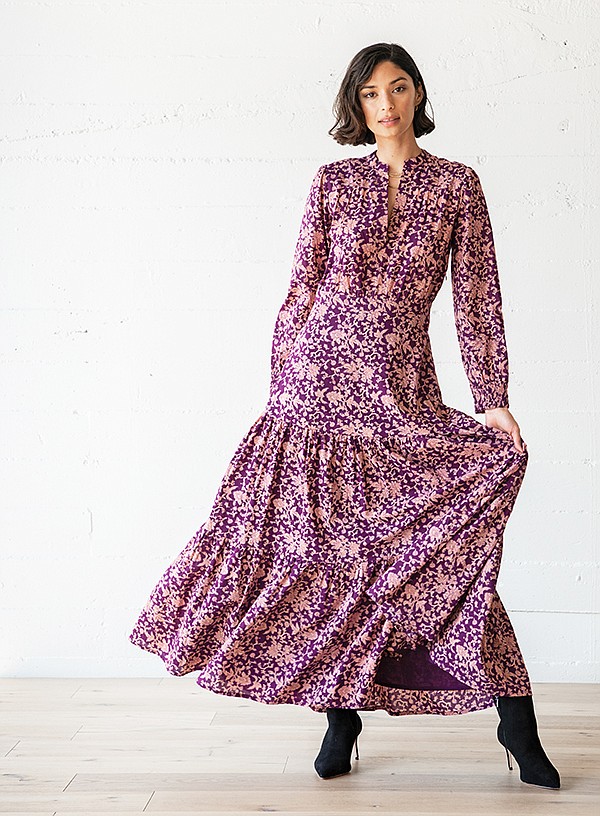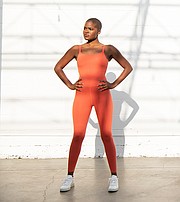ECO WVN
WVN Launches With Eco Focus on Responsibly Made Fashion
Photo Gallery
WVN Launches With Eco Focus on Responsibly Made Fashion
Building on her nearly 30-year career in fashion, Kate Fisher recently launched WVN, a responsibly made sustainable brand that focuses on artistry. | Photos courtesy of WVN
Connecting her clientele with quality products made from artists located in India and Nepal has defined the career of Kate Fisher, who began collecting goods during her travels in 1993 and then reselling the textiles and clothing upon her return to the United States. This wasn’t an intentional path for Fisher, who notes that her feelings of admiration for the work of artists in these areas simply led to an entrepreneurial pursuit that would develop into a career.
“It went from being a globe-trotting hobby to a full-fledged clothing business and me getting involved in clothing and starting to do trade shows several years into it,” Fisher said. “I started building some wholesale accounts throughout the United States in addition to selling at local street festivals and at Grateful Dead shows. That was the first marketplace where I first sold a product.”
Recently Fisher announced the launch of WVN, a brand of stylish classics that draws from her East Coast roots and current California lifestyle blended with certain elements of India and Nepal. Launched in August, the company, which is a venture that the entrepreneur runs with her husband, Henry Schwab, has retained the B Corp certification of Fisher’s previous brand, Synergy, and is created according to principles of ecological conscientiousness, fair-labor practices and elevating women.
“The world has changed a lot since the ’90s, and we are experiencing firsthand people fearing what is happening to our planet,” Fisher explained. “I think that the fashion industry realizes it, and to their credit there are a lot of people now who genuinely care. There are also some people probably green washing, trying to have their slogans of how they are socially and eco conscious and responsible, and some of it might not be authentic but a lot of it is authentic, and I think that is wonderful.”
WVN’s pieces are made in three factories located in India and Nepal. There is a heavy reliance on organic cotton and GOTS-certified sourcing. In addition to the arduous process connected to becoming B Corp certified, Fisher remains committed to maintaining an ethical, sustainable approach to production. Focused on continuing the responsible manufacturing she has prioritized during her career, Fisher knows her factories and had visited them often to see them firsthand prior to the onset of the COVID-19 pandemic.
“I make sure that I visit the factories, and I know the factory owners and what their working conditions are and feel that the values align with what our values are,” Fisher said. “It’s something I could feel a long time ago visiting factories where there was no way I was going to work on that factory floor and make our clothing there.”
Within the ethos of WVN is a sense that the brand has been created in recognition of the many facets of women’s personalities. The WVN woman is chic yet sporty; strong yet feminine; and unique yet opens her arms to community.
“I think that people who identify as women tend to have some closet staples that they have in heavy rotation,” Fisher noted. “One thing that inspires me is reinventing really classic pieces in a sustainable way that feel they can be worn season after season.”
Available online at shopwvn.com and at select boutiques—averaging 80–100 stores per season—WVN is available in XS–XL and priced from $48 for a camisole to $288 for a woven organic-cotton voile dress with a hand-painted vine-block print design. Both rely on organic cotton and are GOTS certified. There is also a more affordable line called WVN for You that is sold at 450 Whole Foods stores throughout the United States and Canada at price points ranging from $28 for accessories to $68 for clothing.
Looking ahead, Fisher hopes that the sustainable mission of the fashion industry is one of camaraderie. For her part, Fisher takes every opportunity to promote collaborative messaging.
“One of our hashtags is #WVNTogehter, because I feel we are all in this together—even people who are our competitors. People who are our customers. We’re all in this together,” Fisher said. “Everybody in the apparel industry is in it together—from the supply chain to the trade shows to the media.”























